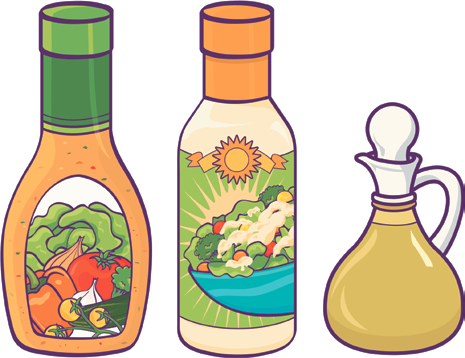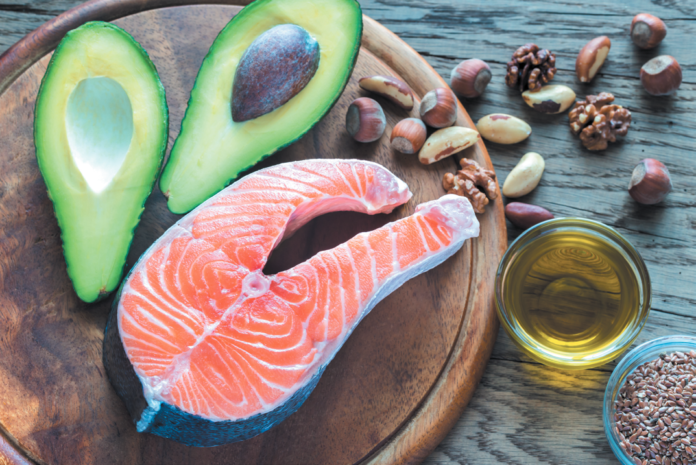There are many different kinds of dietary fats—the lipids found naturally in the foods we eat. “Choosing the right kinds of fats, rather than avoiding fat altogether, is the healthy choice,” says Alice H. Lichtenstein, DSc, director of the Cardiovascular Nutrition Laboratory at the Jean Mayer USDA Human Nutrition Research Center on Aging.
Fats, Plural: Dietary fats come in different sizes and shapes, and their structure determines how they are broken down, metabolized, and transported in the human body. “Not all fat is bad,” says Penny Kris-Etherton, PhD, RDN, distinguished professor in the department of nutrition science at Penn State University. “Their impact on our health is determined by their structure.” Since different kinds of fats are found in different kinds of foods, we can easily make food choices that emphasize healthier fats.
Swapping Fats: “Aiming for a low-fat diet is not the key to good nutrition, and can actually result in a lower quality diet,” says Lichtenstein. “When people remove fats from their diet, they commonly replace them with refined carbohydrates—choosing pretzels instead of nuts, for example, or fat-free salad dressing instead of regular. These swaps end up cutting out the types of fats that are good for us.” Large clinical trials confirm that swapping total fats with carbohydrate produces no health benefits, while increasing foods rich in healthy fats, in place of carbohydrate, lowers cardiovascular disease (CVD) and diabetes. Replacing certain foods high in saturated fat with others rich in unsaturated fat (primarily polyunsaturated fat) also reduces CVD. That means swapping out foods like butter, processed meats, and refined grains and replacing them foods like nuts, seeds, fatty fish, and plant oils like soybean, canola, and extra virgin olive oils. According to the American Heart Association’s presidential advisory, Dietary Fats and Cardiovascular Disease, randomized controlled trials that lowered intake of dietary saturated fat and replaced it with polyunsaturated plant oil reduced CVD by around 30 percent, which is similar to the reduction achieved by treatment with statin drugs.

Image © peanutpie | Getty Images
What to Do: “Unfortunately, many people are still avoiding all fat, even though guidelines recommending limiting total dietary fat intake changed 20 years ago,” says Lichtenstein. Rather than aiming for a low-fat diet, make simple swaps, like choosing fish in place of meat, soybean or canola oils in place of butter, and avocados in place of croutons or bacon bits in salads. Avoiding some types of carbohydrates is also important: “When experts talk about avoiding simple carbs, we don’t mean the kind found naturally in fruits and dairy,” says Kris-Etherton. “It’s the added sugars and highly refined, ultra-processed carb food sources like white bread and sweet treats that we all need to limit or avoid.”
Kris-Etherton stresses the importance of including omega-6 polyunsaturated fats from foods like nuts, seeds, vegetable oils like soybean and corn, and salad dressings made from these oil in our diets. But overall, “the message is clear,” says Kris-Etherton. “Get saturated fat intake down and replace it with unsaturated fats—not with simple carbs like added sugars and refined starches like white bread, white rice, and low-fiber ready-to-eat cereals.”
While research is clear that, in general, replacing foods high in saturated fats with foods high in unsaturated fats is good for health, some questions remain for researchers:
Coconut Oil: Coconut oil, which is high in saturated fat, has been branded a “superfood” in the media because it contains medium-chain fats, which have been purported to have health benefits. After much research, there are still no solid data to support the health benefits attributed to consuming coconut oil.
Dairy: Some research suggests full-fat dairy products are associated with health benefits, even though they are high in saturated fat. Growing evidence suggests that the type of dairy (yogurt, cheese, or milk) may be more important than the fat content.
To improve cardiovascular health, don’t avoid fattry these tips instead:
-Maintain a healthy weight.
-Choose foods rich in heart-healthy poly- and monounsaturated fatslike nuts, seeds, avocados, fatty fish, and plant oilsin place of animal fats from butter and red meats.
-Use soybean, extra virgin olive, and canola oils for food preparation and seasoning.
-Be judicious about choosing low-fat or fat-free versions of foods. They are often high in starch, added sugars, and salt.






















Soybeans and canola oil made from a variety of rapeseed. Unbelievable why?
What’s your opinion of Avocado oil?
Thanks!
Good info
thank you, good information. Guy
Thanks, for the information that Tufts and its staff provide to help people navigate though the food maze in today’s world. I know longer take the Tufts Newsletter, for as I pass seventy eight years of age, I find my studying and reading have lessening to a great degree. Please keep-up the excellent food and nutritional research and passing it on to the public.